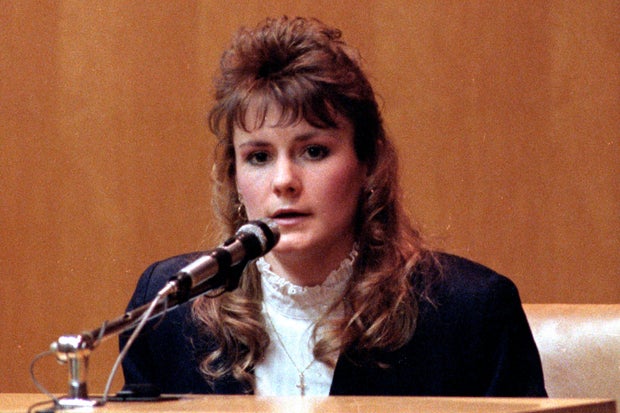CBS News
Pamela Smart accepts responsibility in husband’s 1990 murder for first time

Pamela Smart, who is serving life imprisonment without the possibility of parole for coordinating with her teenage student to have her husband killed in 1990, has accepted responsibility in his death for the first time.
In her latest plea for New Hampshire officials to reduce her sentence, Smart acknowledged that she previously “deflected blame” instead of recognizing her own part in the murder “because the truth of being so responsible was very difficult” for her, while giving a videotaped statement that was released Tuesday. The statement ended with a request for a meeting with New Hampshire Gov. Chris Sununu and the New Hampshire Executive Council, which advises the governor among other duties.
Smart, 56, was a 22-year-old high school media coordinator when she began an affair with a 15-year-old boy who later fatally shot her husband, Gregory Smart, in Derry, New Hampshire. The shooter was freed in 2015 after serving a 25-year sentence. Though Pamela Smart denied knowledge of the plot, she was convicted of being an accomplice to first-degree murder and other crimes and sentenced to life without parole.
Jon Pierre Lasseigne/AP
Smart has been incarcerated for nearly 34 years. Despite repeated attempts at appealing her sentence, she told CBS Boston in a 2019 interview from prison that she would never admit to planning the murder. But Smart said in Tuesday’s statement that she began to “dig deeper into her own responsibility” through her experience in a writing group that “encouraged us to go beyond and to spaces that we didn’t want to be in.
“For me that was really hard, because going into those places, in those spaces is where I found myself responsible for something I desperately didn’t want to be responsible for, my husband’s murder,” she said, her voice quavering. “I had to acknowledge for the first time in my own mind and my own heart how responsible I was, because I had deflected blame all the time, I think, almost as if it was a coping mechanism, because the truth of being so responsible was very difficult for me.”
Smart said she has reflected on her past and believes she has changed since her imprisonment.
“Now that I am older and able to look back on things, I can see so many errors that I made, and see how skewed my judgement was, and how immature I was. Looking backward, you know, I’m such a different person than I was … back then,” she said. “I mean, 34 years is a very long time and during that time I’ve done a lot of work on myself.”
She asked to have an “honest conversation” with New Hampshire’s five-member Executive Council, which approves state contracts and appointees to the courts and state agencies in addition to advising the governor, along with Sununu. The council rejected her latest request in 2022 and Smart appealed to the state Supreme Court, which dismissed her petition last year.
“I’m respectfully asking for the opportunity to come before you, the New Hampshire Executive Council, and have an honest conversation with you about my incarceration, my acceptance of responsibility, and any concerns you might have, any questions,” Smart said at the end of the video. “If I could come in person, or via video conference so that we could share an honest conversation, I would be extremely grateful for that.”
Val Fryatt, a cousin of Gregory Smart, told The Associated Press that Smart “danced around it” and accepted full responsibility “without admitting the facts around what made her ‘fully responsible.'”
Fryatt noted that Smart didn’t mention her cousin’s name in the video, “not even once.”
Messages seeking comment on the petition and statement were sent to the council members, Sununu, and the attorney general’s office.
Smart had exhausted her judicial appeal options when she returned her third petition to the Executive Council seeking a sentence reduction hearing in 2022. The council’s rejection prompted her subsequent appeal to the state Supreme Court, which dismissed the request and said ordering the elected board to reconsider their decision would violate New Hampshire’s separation of powers.
Smart is serving time at Bedford Hills Correctional Facility in Westchester County, New York. She has earned two master’s degrees behind bars and has also tutored fellow inmates, been ordained as a minister and been part of an inmate liaison committee. She said she is remorseful and has been rehabilitated.
Her trial was a media circus and one of America’s first high-profile cases about a sexual affair between a school staff member and a student. Joyce Maynard wrote “To Die For” in 1992, drawing from the Smart case. That inspired a 1995 film of the same name, starring Nicole Kidman and Joaquin Phoenix. The killer, William Flynn, and three other teens cooperated with prosecutors. They served shorter sentences and have been released.
CBS News
Biden blasts Supreme Court ruling on Trump immunity

Watch CBS News
Be the first to know
Get browser notifications for breaking news, live events, and exclusive reporting.
CBS News
Some voters question Biden’s mental fitness after debate

Watch CBS News
Be the first to know
Get browser notifications for breaking news, live events, and exclusive reporting.
CBS News
Trump seeks to overturn criminal conviction, citing Supreme Court immunity decision

Donald Trump is trying to leverage a Supreme Court decision holding that presidents are immune from federal prosecution for official actions to overturn his conviction in a New York State criminal case.
A letter to the judge presiding over the New York case is not yet public. It was filed Monday after the Supreme Court’s landmark holding further slowed the former president’s criminal cases.
A spokesperson for Manhattan District Attorney Alvin Bragg declined to comment when asked about Trump’s effort to overturn the conviction, which was first reported by The New York Times.
Trump’s criminal case in New York is the only one of four against him to go to trial. On May 30, a unanimous jury concluded Trump was guilty of 34 felony counts of falsifying business records in an effort to cover up reimbursements for a “hush money” payment to an adult film star. Trump signed off on falsifying the records while he was in the White House in 2017.
Monday’s Supreme Court decision extended broad immunity from criminal prosecutions to former presidents for their official conduct. But the issue of whether Trump was engaged in official acts has already been litigated in his New York case.
Trump sought in 2023 to move the case from state to federal jurisdiction. His lawyers argued that the allegations involved official acts within the color of his presidential duties.
That argument was rejected by a federal judge who wrote that Trump failed to show that his conduct was “for or relating to any act performed by or for the President under color of the official acts of a president.”
“The evidence overwhelmingly suggests that the matter was purely a personal item of the president — a cover-up of an embarrassing event,” U.S. District Judge Alvin Hellerstein wrote. “Hush money paid to an adult film star is not related to a president’s official acts. It does not reflect in any way the color of the president’s official duties.”
Trump initially appealed that decision, but later dropped it.
His case went to trial in April, and soon after the jury’s unanimous decision finding him guilty, Trump vowed to appeal the conviction.
Trump is scheduled to be sentenced July 11. Prosecutors were expected to file a sentencing recommendation Monday. That filing has not been made public.







